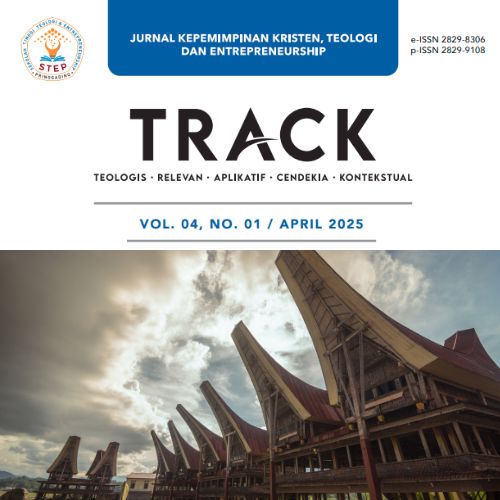SUATU STUDI KEPEMIMPINAN TRADISIONAL SUKU TORAJA TERHADAP 1 PETRUS 2:13-14
DOI:
https://doi.org/10.61660/track.v4i1.209Keywords:
Postcolonial Hermeneutics, Traditional Leadership, To Parengnge', Toraja, Rante BallaAbstract
Resistance to the norms used in indigenous peoples is an effort to provide an instrument of equality to all indigenous peoples for the preservation of culture and the strengthening of communal identity. This article discusses the traditional leadership hegemony used by the nobility which continues to experience criticism from the indigenous peoples themselves. Symbolic resistance in the implementation of customs began to be shown in every feast or activity involving customs. The method used in this study is a qualitative method through a postcolonial hermeneutic approach. A leader is said to be a transformative leader if he is able to bring change in the realm of the organization and the development of its members. The link with the traditional leadership in the indigenous Rante Balla community is that it still adheres to the feudal system. Where leaders are determined from lineage and are still valid for generations in indigenous peoples. In contemporary society, according to the author, this leadership style is a leadership style that needs to be transformed so that it is able to adjust to the context of society that develops in various aspects. People who are already restless with this traditional leadership style need to hold resistance or resistance to ideas made unilaterally and imposed by those who consider themselves to be nobility.
Downloads
References
Bigalke, W. Terance. 2016. Sejarah Sosial Tana Toraja. Yogyakarta: Ombak
Drane, John. 2011. Memahami Perjanjian Baru. Jakarta: BPK Gunung Mulia.
Ensiklopedi Alkitab Masa Kini Jilid II. 1998. Jakarta: Yayasan Komunikasi Bina Kasih/OMF.
Fiorensa, Schussler Elizabeth. 1997. Untuk Mengenang Perempuan Itu. Jakarta: BPK Gunung Mulia.
Hardiman, F. Budi. Seni Memahami. Yogyakarta: Kanisius, 2015.
Haryanto, Sindung. 2016. Sosiologi Agama: Dari klasik hingga postmodern. Yogyakarta: AR-Ruzz Media.
Loomba, Ania. Kolonialisme/Pascakolonialisme. Diterjemahkan oleh Hartono Hadikusumo. Cetakan pertama. Yogyakarta: Narasi, 2016.
Manguju, Yudha Nugraha. “Nilai Teologis Masikka’: Sebuah Ritus di Rantai Damai.” BIA’: Jurnal Teologi dan Pendidikan Kristen Kontekstual 3, no. 1 (28 Juni 2020): 114–27. https://doi.org/10.34307/b.v3i1.169.
Martono, Nanang. Sosiologi Perubahan Sosial: Perspektif Klasik, Modern, Posmodern, dan Poskolonial. Jakarta: Rajawali Pers, 2012.
Palette, Jeni. “Analisis Pertumbuhan Iman Gereja Toraja Jemaat Situru’ pada Masa Konflik DI/TII Tahun 1952-1966.” BIA’: Jurnal Teologi dan Pendidikan Kristen Kontekstual 3, no. 1 (27 Juni 2020): 76–89. https://doi.org/10.34307/b.v3i1.168.
Ritzer, George. Teori Sosiologi. Yogyakarta: Pustaka Pelajar, 2012.
Sutrisno, Mudji dan Putranto, Hendar. 2004. Hermeneutika Pascakolonial. Yogyakarta: Kanisius.
Tangdilintin, L.T. 2008. Toraja dan Kebudayaannya. Jakarta: BPK Gunung Mulia.

Downloads
Published
How to Cite
Issue
Section
License
Copyright (c) 2025 Amsal, Yudha Nugraha Manguju

This work is licensed under a Creative Commons Attribution-NonCommercial-ShareAlike 4.0 International License.















